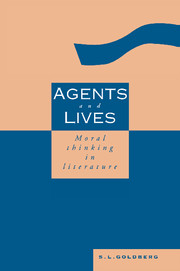Book contents
- Frontmatter
- Contents
- Acknowledgments
- Preface
- 1 ‘Perpetually moralists’ … ‘in a large sense’
- 2 ‘How to live’ and ‘how to live’
- 3 Agents and lives: making moral sense of people
- 4 ‘Doing good to others’: some reflections on Daniel Deronda
- 5 Moral thinking in The Mill on the Floss
- 6 Finding congenial matter: Pope and the art of life
- 7 Literary judgment: making moral sense of poems
- 8 Afterword: some limits of philosophy?
- Notes
- Index
6 - Finding congenial matter: Pope and the art of life
Published online by Cambridge University Press: 19 January 2010
- Frontmatter
- Contents
- Acknowledgments
- Preface
- 1 ‘Perpetually moralists’ … ‘in a large sense’
- 2 ‘How to live’ and ‘how to live’
- 3 Agents and lives: making moral sense of people
- 4 ‘Doing good to others’: some reflections on Daniel Deronda
- 5 Moral thinking in The Mill on the Floss
- 6 Finding congenial matter: Pope and the art of life
- 7 Literary judgment: making moral sense of poems
- 8 Afterword: some limits of philosophy?
- Notes
- Index
Summary
Yet by some object ev'ry brain is stirr'd;
The dull may waken to a Humming-bird;
The most recluse, discreetly open'd find
Congenial matter in the Cockle-kind;
(The Dunciad, IV, 445–8)Pope uses the term ‘moral’ surprisingly little, but when he does, his belief in a total divine, natural and moral order leads him to use it mainly in its narrow, conduct-prescriptive sense, as in the first quotation below, though occasionally in its wide, lifeexploratory sense, as in the second quotation:
What makes all physical or moral ill?
There deviates Nature, and here wanders Will.
not in Fancy's Maze he wander'd long,
But stoop'd to Truth, and moraliz'd his song:
Who now reads Cowley? if he pleases yet,
His moral pleases, not his pointed wit;
Forgot his Epic, nay Pindaric Art,
But still I love the language of his Heart.
In this third passage, I take it that ‘moral’ means something like Cowley's sense of and observations on human life: how he ‘sees’ it.
But if Pope's beliefs make his use of the word ‘moral’ itself not very interesting, there is an interesting doubleness in his conception of ‘integrity’, and also, I think, a developing complexity in his conception of what we might call (though not in J. S. Mill's restricted sense) poetic ‘arts of life’. By this I mean those ways of being alive that poems exhibit but which they also offer their readers, less as examples or ideal models of how to live, than as something rather like moral ‘touchstones’ (to borrow Arnold's term): necessarily particular, individual modes of life by which readers might better discern the nature and value of others' lives and especially of their own.
- Type
- Chapter
- Information
- Agents and Lives , pp. 186 - 222Publisher: Cambridge University PressPrint publication year: 1993



